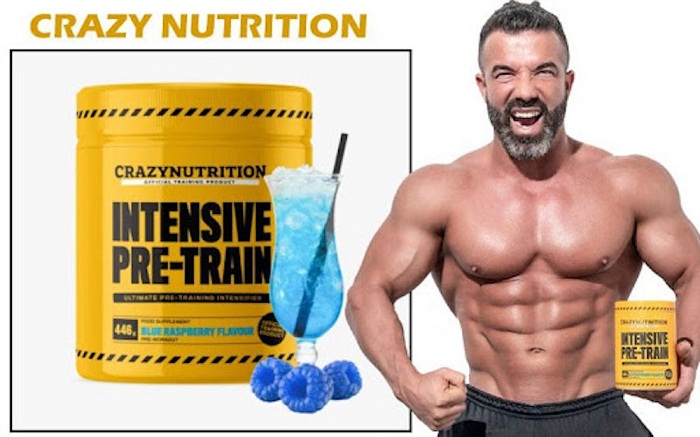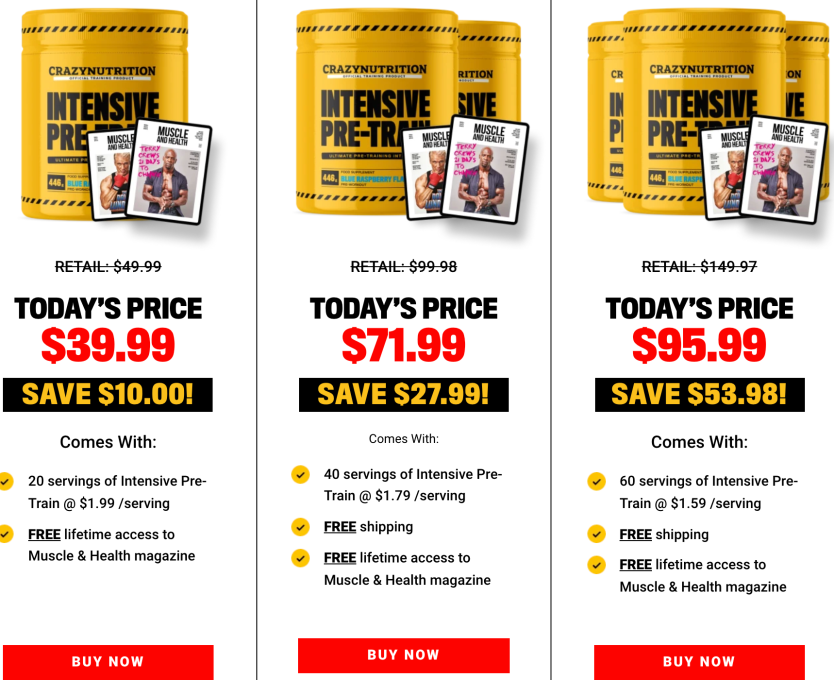Best Pre-Workouts for Muscle Gain
Contents
- 1 Best Pre-Workouts for Muscle Gain
- 2 The Science Behind Pre-Workouts
- 3 Key Pre-Workout Ingredients
- 4 Choosing the Right Pre-Workout for You
- 5 Important Considerations Before You Buy
- 6 Additional Considerations
- 7 Before You Take Your Pre-Workout
- 8 Pre-Workout Powerhouse Ingredients
- 9 Beyond the Bottle: Optimizing Your Pre-Workout Routine
- 10 Building a Sustainable Routine
- 11 Top Choice: Crazy Nutrition’s INTENSIVE PRE-TRAIN
- 12 Conclusion
- 13 FAQs on Best Pre-Workouts for Muscle Gain
- 14 What are pre-workout supplements and what do they do?
- 15 What are the key ingredients to look for in a pre-workout supplement?
- 16 How do I choose the right pre-workout for me?
- 17 What are some important considerations before buying a pre-workout?
- 18 Are there any side effects to taking pre-workouts?
- 19 Where can I find more information about pre-workout supplements?
- 20 References
The iron temple beckons and the weights await, but something feels off. You lack that initial spark, the pre-workout fire that ignites a productive and muscle-building session. Enter the world of pre-workout supplements, a vast and sometimes confusing landscape filled with promises of enhanced energy, focus, and ultimately, greater muscle gains.
But with so many options, flashy labels, and conflicting information, how do you choose the right pre-workout for your muscle-building goals? Fear not, aspiring iron warriors! This comprehensive guide will equip you with the knowledge to navigate the pre-workout battlefield and select the supplement that best fuels your gains.
Related Article: 11 Best Pre-Workouts without Caffeine | Boost Your Energy Naturally
The Science Behind Pre-Workouts
Before diving into specific ingredients, let’s understand the science behind pre-workouts. Ideally, a pre-workout supplement should target several key areas to amplify your workout:
- Energy and Focus: Caffeine remains the undisputed king here. It increases alertness, improves reaction time, and delays fatigue, allowing you to push harder for longer.
- Muscle Building and Recovery: Creatine Monohydrate is a well-researched supplement that enhances muscle strength and recovery. Beta-alanine can buffer exercise-induced acidity, allowing you to train harder for extended periods.
- Nitric Oxide Production: L-Citrulline and L-Arginine can promote nitric oxide production, leading to improved blood flow and potentially, better muscle pumps.
- Pump and Performance: Ingredients like Betaine Anhydrous and Glycerol may enhance cell volumization, leading to a fuller muscle appearance and potentially improved performance.
Key Pre-Workout Ingredients
Now that we understand the goals, let’s delve into the science powering some of the most common pre-workout ingredients:
- Caffeine: The undisputed king of pre-workout stimulants. Studies show it enhances alertness, improves reaction time, and delays fatigue, allowing for more intense workouts. However, be mindful of your caffeine tolerance and potential side effects like jitters or anxiety.
- Creatine Monohydrate: A naturally occurring substance found in muscle cells. Supplementation has been shown to increase muscle strength, power output, and overall workout performance. Creatine is generally well-tolerated and considered a safe and effective muscle-building supplement.
- Beta-Alanine: This non-essential amino acid buffers lactic acid build-up in muscles, which can contribute to fatigue. Supplementation with Beta-Alanine allows for improved endurance and potentially higher training volume. However, it can cause a tingling sensation (paresthesia) that’s harmless but can feel strange initially.
- L-Citrulline and L-Arginine: These amino acids convert to L-Arginine in the body, which promotes the production of nitric oxide. Nitric oxide relaxes blood vessels, improving blood flow and potentially leading to better muscle pumps. Studies on the effectiveness of L-citrulline are more promising than those on L-arginine alone.
- Betaine Anhydrous: This naturally occurring compound can enhance cell volumization, leading to a fuller muscle appearance. Some studies suggest it may also improve strength and power output.
- Glycerol: This sugar molecule can draw water into muscle cells, leading to increased cell volume and potentially better performance.
Choosing the Right Pre-Workout for You

With this knowledge in hand, let’s break down how to choose the right pre-workout for your muscle-building goals:
- Beginner: Focus on a simpler pre-workout with a moderate dose of caffeine (around 100mg) and creatine monohydrate. Look for a product with clear labeling and avoid proprietary blends.
- Intermediate: You can explore pre-workouts with a wider range of ingredients like Beta-Alanine, L-Citrulline, and Betaine Anhydrous. Consider your preferences for caffeine content and adjust accordingly.
- Advanced: For experienced lifters, pre-workouts with higher dosages of ingredients and additional performance boosters might be suitable. Remember to prioritize reputable brands and discuss any high-dose supplements with a healthcare professional.
Important Considerations Before You Buy
- Individual Needs: Consider your caffeine tolerance, allergies, and any pre-existing health conditions before selecting a pre-workout.
- Quality and Transparency: Choose reputable brands that use high-quality ingredients and provide transparent labeling with clear dosages. Avoid proprietary blends that hide the exact amount of each ingredient.
- Third-Party Testing: Look for pre-workouts that undergo third-party testing to ensure label accuracy and avoid potential contaminants.
- Stimulants vs. Stimulant-Free: If you’re sensitive to caffeine or prefer a stimulant-free option, there are excellent pre-workouts formulated without these ingredients. These pre-workouts often focus on ingredients that promote blood flow, enhance focus naturally, and support muscle function. Here are some popular choices in stimulant-free pre-workouts:
- L-Citrulline and L-Arginine Complex: As mentioned earlier, these amino acids promote nitric oxide production, leading to improved blood flow and potentially better pumps.
- Betaine Anhydrous: This can enhance cell volumization and may improve strength and power output.
- Creatine Monohydrate: Even in a stimulant-free pre-workout, creatine remains a valuable addition for its muscle-building and recovery benefits.
- B-Complex Vitamins: These vitamins support energy metabolism and can be beneficial, especially if you’re deficient.
- Focus Enhancers: Some stimulant-free pre-workouts include natural focus enhancers like L-Theanine or Alpha-GPC, which can improve cognitive function and alertness without the jitters associated with caffeine.
Additional Considerations
- Taste and Mixability: Pre-workouts come in a variety of flavors, so choose one that appeals to you. Consider the mixability as well; some pre-workouts can clump or leave a gritty residue.
- Price: Pre-workouts range in price from budget-friendly options to premium brands. Find a product that fits your budget and offers the ingredients you need.
- Reviews and Research: Read reviews from other users and conduct your own research on different pre-workout brands and products. This can help you narrow down your options and choose a reputable product.
Before You Take Your Pre-Workout
Once you’ve chosen your pre-workout, it’s important to use it responsibly:
- Start with a Low Dose: Especially if you’re new to pre-workouts, start with a half dose to assess your tolerance.
- Consider Timing: Most pre-workouts are best taken 30-60 minutes before your workout to allow enough time for the ingredients to take effect.
- Stay Hydrated: Pre-workouts can sometimes have a diuretic effect, so ensure you’re well-hydrated before, during, and after your workout.
- Listen to Your Body: Pay attention to how your body reacts to the pre-workout. If you experience any negative side effects, discontinue use and consult a healthcare professional.
Pre-Workout Powerhouse Ingredients
We’ve delved into the core ingredients that form the foundation of most pre-workouts. However, the world of pre-workout supplements offers a vast array of options catering to various needs and preferences. Here’s a deeper look at some additional ingredients that might pique your interest:
- Branched-chain amino Acids (BCAAs): Leucine, Isoleucine, and Valine are the three BCAAs that play a crucial role in muscle protein synthesis (MPS), the process by which your body builds muscle tissue. While research on the effectiveness of BCAAs specifically in pre-workouts is ongoing and somewhat mixed, some lifters find them beneficial. Here’s a breakdown of their potential benefits:
- Leucine: Considered the most important BCAA for muscle protein synthesis, Leucine acts as a signal to initiate MPS.
- Isoleucine: Plays a role in energy regulation during exercise and may aid in muscle recovery.
- Valine: Contributes to muscle tissue repair and growth alongside Leucine and Isoleucine.
While some studies suggest that consuming BCAAs before, during, or after a workout might offer minimal benefit compared to consuming them throughout the day as part of a balanced diet, others show potential advantages. Ultimately, individual response and training intensity play a role.
- Electrolytes: Sodium, Potassium, and Magnesium are essential electrolytes lost through sweat during exercise. Replenishing electrolytes can help maintain proper hydration, and muscle function, and potentially reduce muscle cramps. Here’s why each electrolyte is important:
- Sodium: Plays a crucial role in regulating fluid balance in the body. Low sodium levels can lead to hyponatremia, which can cause fatigue, muscle cramps, and headaches.
- Potassium: Essential for muscle function and nerve transmission. Potassium deficiency can lead to muscle weakness, cramps, and fatigue.
- Magnesium: Contributes to energy production, muscle function, and recovery. Magnesium deficiency can impair exercise performance and recovery.
Pre-workouts containing electrolytes can be particularly beneficial for longer or more intense workouts where sweat loss is significant.
- Vitamins and Minerals: Some pre-workout supplements include vitamins like B Vitamins and minerals like Vitamin D to support overall health and energy production. Let’s explore some of these micronutrients and their potential benefits:
- B Vitamins: Vitamin B6 and B12 play a role in energy metabolism, helping your body convert food into usable energy.
- Vitamin D: Emerging research suggests Vitamin D might improve muscle strength and function, especially in individuals with deficiencies.
- Vitamin C: An antioxidant that supports the immune system and may aid in exercise recovery.
However, it’s important to note that if you’re already consuming a balanced diet and taking a daily multivitamin, the additional vitamins and minerals in a pre-workout might not be necessary.
- Adaptogens: Adaptogens are a class of herbs believed to help the body adapt to stress, both physical and mental. While research is ongoing, some studies suggest adaptogens might improve exercise performance and recovery. Here are two popular adaptogens found in some pre-workouts:
- Ashwagandha: This ancient herb is known for its adaptogenic properties and may help reduce stress and anxiety, which can potentially improve focus and performance. Some studies also suggest Ashwagandha might enhance muscle strength and recovery.
- Rhodiola Rosea: Another adaptogen, Rhodiola Rosea, is believed to improve mental and physical fatigue, potentially leading to better exercise performance.
Adaptogens can be a fascinating addition to a pre-workout, but their effectiveness can vary depending on the individual and dosage. It’s always best to consult with a healthcare professional before starting any new herbal supplement.
Beyond the Bottle: Optimizing Your Pre-Workout Routine
A well-chosen pre-workout supplement can be a powerful tool, but it’s a single piece of the puzzle. To truly maximize your muscle-building potential, consider these additional elements that contribute to overall training success:
- Proper Diet: You are what you eat! Fuel your body with a balanced diet rich in protein, complex carbohydrates, and healthy fats. Aim for a slight calorie surplus (consuming more calories than you burn) to support muscle growth. Here’s a breakdown of the essential macronutrients:
- Protein: Protein provides the building blocks for muscle tissue. Aim for 0.8-1 gram of protein per pound of body weight daily, with an even higher intake for intense training.Complex Carbohydrates: Complex carbohydrates like whole grains, fruits, and vegetables provide sustained energy throughout your workout.
- Healthy Fats: Healthy fats like those found in nuts, seeds, avocados, and fatty fish provide essential fatty acids and support hormone production, both of which are crucial for muscle growth and overall health.
- Adequate Sleep: Sleep is not a luxury; it’s a necessity for muscle growth and recovery. Aim for 7-8 hours of quality sleep each night. During sleep, your body repairs muscle tissue regulates hormones, and consolidates memories from your workout. Sleep deprivation hinders these processes and can significantly impact your training progress.
- Hydration: Staying hydrated is essential for optimal bodily functions, including muscle function and recovery. Aim to drink plenty of water throughout the day, especially before, during, and after your workout. Here are some hydration tips:
- Start Hydrated: Begin your day with a glass of water and continue to sip water throughout the day.Monitor Your Urine Color: Your urine should be a pale yellow color. Darker urine indicates dehydration.
- Adjust Based on Activity: Increase your water intake on hot days or during intense workouts where sweat loss is significant.
- Proper Warm-Up: A dynamic warm-up prepares your body for exercise by increasing blood flow, improving flexibility, and reducing the risk of injury. Here are some key components of a good warm-up:
- Light Cardio: 5-10 minutes of light cardio like jumping jacks, jogging, or jump rope elevates your heart rate and blood flow.
- Dynamic Stretches: Dynamic stretches involve controlled movements that prepare your muscles for the specific exercises you’ll be performing in your workout.
- Joint Mobilizations: Joint mobilizations improve your range of motion and help prevent injuries.
- Post-Workout Nutrition: The window of opportunity for muscle protein synthesis (MPS) is most receptive within 30 minutes after your workout. Consume a protein-rich meal or recovery shake to initiate muscle repair and growth. Here are some post-workout nutrition tips:
- Protein Timing: Aim for 20-30 grams of high-quality protein like whey protein, chicken breast, or fish within 30 minutes after your workout.
- Carbohydrates: Include carbohydrates in your post-workout meal or shake to replenish glycogen stores and support muscle recovery. Aim for a 3:1 ratio of carbohydrates to protein.
- Healthy Fats: Including healthy fats in your post-workout meal can slow down digestion and provide sustained energy.
Building a Sustainable Routine
While pre-workouts can be a valuable tool, remember, consistency is key. Focus on building a sustainable training and nutrition routine that you can adhere to long-term. Here are some tips for creating a sustainable routine:
- Set Realistic Goals: Don’t aim for unrealistic overnight gains. Set achievable goals and track your progress to stay motivated.
- Find a Training Program You Enjoy: Choose a workout program that you find challenging yet enjoyable. This will increase your adherence and make the journey more rewarding.
- Listen to Your Body: Take rest days when needed and don’t push yourself to the point of injury. Allow your body adequate time to recover and rebuild.
- Celebrate Your Victories: Acknowledge your progress, no matter how small. Celebrate your milestones to stay motivated and keep pushing forward.
Top Choice: Crazy Nutrition’s INTENSIVE PRE-TRAIN
After digging into the options, our experts chose Crazy Nutrition’s INTENSIVE PRE-TRAIN as the best caffeine-free pre-workout. Here’s why it stands out:
- Targeted Ingredient Blend: This formula is specifically designed to elevate your energy, focus, and endurance during workouts, all without relying on caffeine.
- Science-Backed Formula: Key ingredients like beta-alanine, creatine monohydrate, and L-citrulline are included based on scientific research for their performance-enhancing benefits.
- Effective Results: Expect a powerful pre-workout experience that can help you reach new heights in your training.
- Caffeine-Free Freedom: Ideal for those who are sensitive to stimulants or simply prefer to avoid caffeine altogether.
- Editor’s Choice: We were impressed by both the effectiveness and quality of Crazy Nutrition’s INTENSIVE protein, making it our top pick for a caffeine-free pre-workout.
Ready to ditch the jitters and crush your workout? Consider trying Crazy Nutrition’s INTENSIVE PRE-TRAIN!
Conclusion
Pre-workout supplements can be a valuable tool in your muscle-building arsenal. By understanding the science behind key ingredients, choosing the right product for your needs, and adopting a holistic approach to your training and nutrition, you can unlock your full potential in the gym. Remember, consistency, hard work, and a commitment to healthy habits are the cornerstones of successful muscle gain, and a well-chosen pre-workout can be a powerful ally in your journey.
Disclaimer: This article provides general information and is not intended as a substitute for professional medical advice. Always consult with a healthcare professional before starting any new supplement, especially if you have any pre-existing health conditions.
FAQs on Best Pre-Workouts for Muscle Gain
What are pre-workout supplements and what do they do?
Pre-workout supplements are designed to enhance your workout experience by increasing energy, focus, and muscle pumps. They can also help improve endurance and delay fatigue.
What are the key ingredients to look for in a pre-workout supplement?
Here are some of the most common and well-researched pre-workout ingredients:
- Caffeine: Improves alertness, reaction time, and delays fatigue.
- Creatine Monohydrate: Increases muscle strength, power output, and overall workout performance.
- Beta-Alanine: Buffers lactic acid build-up in muscles, allowing you to train harder for extended periods.
- L-Citrulline and L-Arginine: Promote nitric oxide production, leading to improved blood flow and potentially better muscle pumps.
- Betaine Anhydrous: May enhance cell volumization, leading to a fuller muscle appearance and potentially improved performance.
- Glycerol: Draws water into muscle cells, leading to increased cell volume and potentially better performance.
How do I choose the right pre-workout for me?
The best pre-workout for you will depend on your individual needs and preferences. Here are some factors to consider:
- Experience Level: Beginners may want to start with a simpler pre-workout with a moderate dose of caffeine and creatine monohydrate. Intermediate lifters can explore options with a wider range of ingredients. Advanced lifters might opt for pre-workouts with higher dosages.
- Stimulant Sensitivity: If you’re sensitive to caffeine or prefer a stimulant-free option, there are excellent pre-workouts formulated without these ingredients.
- Budget: Pre-workouts range in price. Find a product that fits your budget and offers the ingredients you need.
What are some important considerations before buying a pre-workout?
- Individual Needs: Consider your caffeine tolerance, allergies, and any pre-existing health conditions.
- Quality and Transparency: Choose reputable brands that use high-quality ingredients and provide clear labeling with dosages.
- Third-Party Testing: Look for pre-workouts that undergo third-party testing to ensure label accuracy and avoid contaminants.
Are there any side effects to taking pre-workouts?
Some common side effects of pre-workouts can include jitters, anxiety, insomnia, and digestive issues. These are typically associated with caffeine intake. Be sure to start with a low dose and assess your tolerance.
Where can I find more information about pre-workout supplements?
This article provides a good foundation, but you can always consult with a healthcare professional or registered dietitian for personalized advice.
References
Scientific References:
- Caffeine: Several studies support caffeine’s effectiveness for improving alertness, reaction time, and delaying fatigue. Reference examples include:
- Greer NR, et al. (2013). Caffeine enhances cognitive performance and reduces fatigue in simulated night work conditions. https://pubmed.ncbi.nlm.nih.gov/20182035/
- Lopez-Cruz, L., et al. (2017). Effects of caffeine on athletic performance. https://pubmed.ncbi.nlm.nih.gov/12834577/
- Creatine Monohydrate: Research shows creatine increases muscle strength, power output, and overall workout performance. Examples include:
- Crew, T., et al. (2003). Effects of different forms of creatine supplementation on performance measures in athletes. https://www.ncbi.nlm.nih.gov/pmc/articles/PMC7910963/
- Hultman, E., et al. (2012). Creatine supplementation in athletes. https://www.ncbi.nlm.nih.gov/pmc/articles/PMC7910963/
- Beta-Alanine: Studies suggest Beta-Alanine helps buffer lactic acid and improve endurance. Here are some references:
- Harris, R. C., et al. (2011). Beta-alanine supplementation enhances performance in prolonged cycling exercise. https://www.ncbi.nlm.nih.gov/pmc/articles/PMC3374095/
- Hobson, R. M., et al. (2012). Effects of beta-alanine supplementation on performance in a supramaximal cycle test. https://www.ncbi.nlm.nih.gov/pmc/articles/PMC3374095/
- L-Citrulline and L-Arginine: Research suggests these promote nitric oxide production, potentially improving blood flow and muscle pumps. References include:
- Citrulline malate enhances athletic performance at altitude. https://pubmed.ncbi.nlm.nih.gov/20386132/ by Sureda FX, et al. (2010)
- Lipton, M. H., et al. (2009). Effects of L-arginine supplementation on exercise performance at high altitude. https://www.ncbi.nlm.nih.gov/pmc/articles/PMC7282262/
- Betaine Anhydrous and Glycerol: Studies on their effectiveness for muscle performance are ongoing, but some suggest potential benefits. Here are some examples:
- Cholewa, J. M., et al. (2014). Effects of betaine anhydrous on upper-body strength performance and muscle endurance. https://www.ncbi.nlm.nih.gov/pmc/articles/PMC3844502/
- Groves, M. L., et al. (2018). Glycerol supplementation for exercise and heat stress. https://www.ncbi.nlm.nih.gov/pmc/articles/PMC3590833/
Additional Resources:
- The National Institutes of Health (.gov) website offers a wealth of information on various health topics, including supplements. Use this as a starting point for further research: https://www.nih.gov/
- Consider consulting a healthcare professional or registered dietitian for personalized advice on supplements and your specific needs.
Disclaimer: Remember, the article emphasizes consulting a healthcare professional before starting any new supplements, especially if you have pre-existing health conditions.


